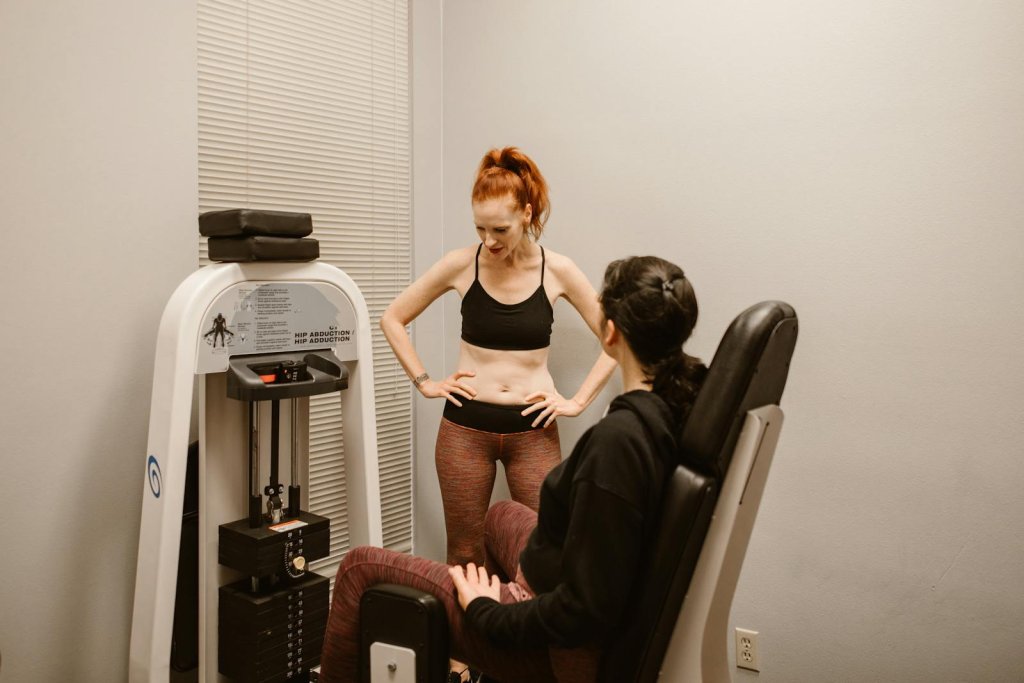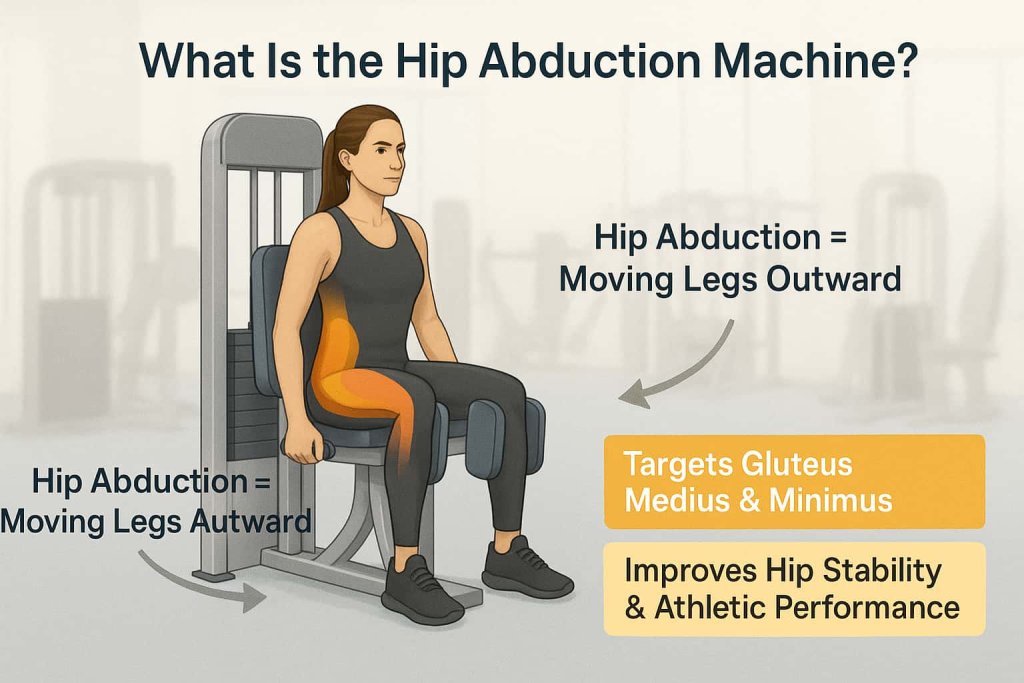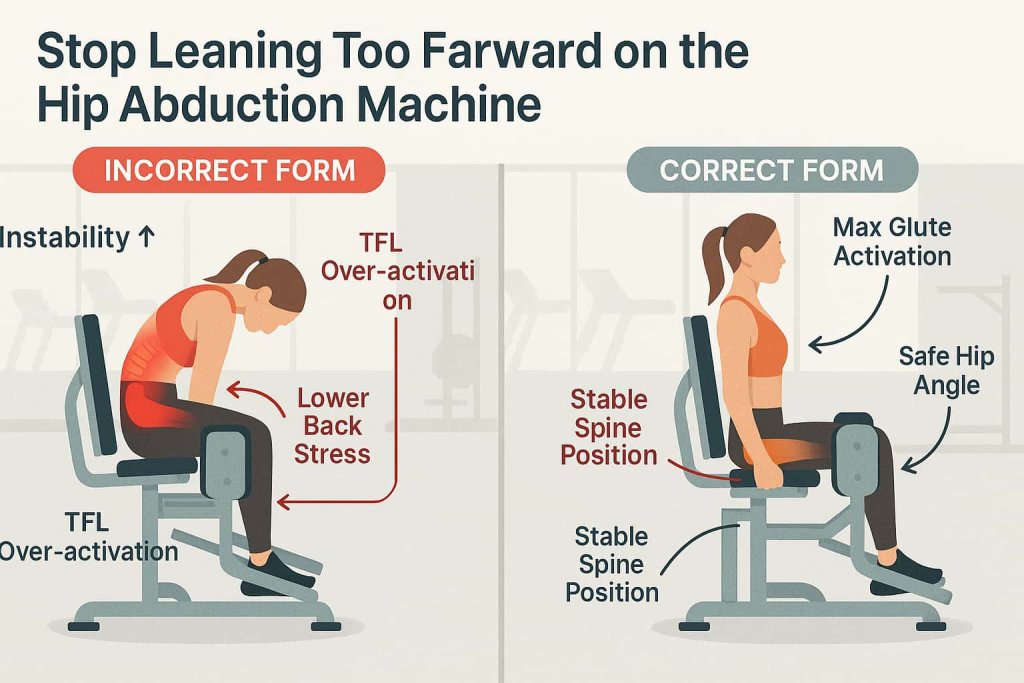Yes, leaning too far forward on the hip abduction machine is a common mistake that reduces effectiveness and increases injury risk.

The hip abduction machine is designed to strengthen the gluteus medius, minimus, and upper gluteus maximus. But form is everything. Leaning excessively forward—a trend made popular by social media—does more harm than good. Understanding the correct technique ensures you target the right muscles, protect your spine, and get maximum results.
What Is the Hip Abduction Machine?
The hip abduction machine allows you to push your legs outward against resistance while seated. This isolates the muscles responsible for hip abduction—the movement that drives your legs apart.

Muscles Worked:
- Primary: Gluteus medius, gluteus minimus
- Secondary: Upper gluteus maximus, tensor fasciae latae (TFL)
These muscles play a major role in hip stability, balance, and overall glute development. Strong abductors reduce the risk of knee valgus (knees caving in) during squats and improve athletic performance.
Correct Hip Abduction Machine Form
- Set Up the Machine
- Adjust the thigh pads to fit snugly against your outer thighs.
- Sit upright with your back pressed firmly against the pad.
- Brace Your Core
- Keep your spine neutral.
- Press your lower back into the support.
- Perform the Movement
- Exhale as you push your legs outward.
- Move through a full range of motion without jerking.
- Inhale as you return slowly to the starting position.
- Tempo & Control
- Use a controlled 2–3 second eccentric (return phase).
- Avoid bouncing or slamming the weights.
👉 Trainer Tip: Start with moderate weight and 12–15 controlled reps for best muscle activation.
Stop Leaning Too Far Forward
Leaning forward on the machine has become a trend, but experts warn against it.

- Too much forward lean (beyond 45°):
- Reduces stability
- Increases risk of lower back pain
- Shifts focus onto the TFL (a small, already overactive muscle) instead of the glutes
- Optimal positioning:
- Sit upright for maximum stability and gluteus medius focus
- A slight forward lean (~30–45°) can help recruit the upper gluteus maximus, but anything more is unsafe
How Posture Changes Muscle Targeting
| Position | Primary Target Muscles | Effectiveness & Risks |
|---|---|---|
| Upright (neutral) | Gluteus medius, minimus | Safest, most stable |
| Slight forward (30–45°) | Gluteus medius + upper gluteus maximus | Effective variation |
| Excessive forward (>45°) | TFL + reduced glute activation | High risk, not advised |
| Leaning backward | Gluteus medius/minimus, less glute max | Less effective overall |
Common Mistakes to Avoid
- Leaning excessively forward → Shifts work away from the glutes.
- Arching or slouching back → Causes spinal strain.
- Using momentum → Swinging reduces muscle activation.
- Short range of motion → Cuts results in half.
Benefits of Proper Hip Abduction Training
When done correctly, the hip abduction machine builds strength and stability that carries over into bigger lifts and daily movement.
- Enhances glute symmetry and shape
- Improves squat and deadlift form
- Reduces knee and hip injuries
- Strengthens pelvic stability for athletes and runners
- Supports better posture and balance
Trainer Tip: Hip abduction training builds the “side-glute,” improves hip stability, prevents knee valgus, and protects the lower back. Keep your torso upright and move slowly for maximum glute activation.
Trainer Tips for Safer & Stronger Glutes
- Keep sets in the 10–20 rep range for growth and endurance.
- Pair with compound lifts (squats, lunges, hip thrusts) for best results.
- Add tempo control (slow negatives, pauses) to maximize glute activation.
- Perform 2–3 times per week, progressively adding resistance.
FAQs
1. Should I lean forward on the hip abduction machine?
A slight forward lean (30–45°) can engage more glute max, but sitting upright is safest and most effective.
2. Is the hip abduction machine bad for your back?
Not if you maintain a neutral spine. Excessive leaning or rounding increases strain.
3. How much weight should I use?
Choose a weight you can control for 12–15 reps without swinging.
4. Does it grow your glutes?
Yes. It primarily builds the gluteus medius and minimus, creating rounder, fuller hips.
5. Should men use the hip abduction machine?
Absolutely. Strong abductors support squats, deadlifts, and athletic movements for both men and women.
6. Is leaning backward better?
No, it decreases glute engagement and isn’t recommended.
7. How often should I train hip abduction?
2–3 sessions per week is enough for strength and hypertrophy gains.
Conclusion
Leaning too far forward on the hip abduction machine hurts more than it helps. The most effective and safest technique is to sit upright with a neutral spine and move through a full range of motion. A small forward lean is acceptable for variety, but stability and control should always come first.
👉 Want stronger, rounder, and safer glutes? Next time you use the hip abduction machine, stay upright, slow down, and let your glutes—not momentum—do the work.
Reference:
- de Almeida Paz, I., Freitas, F. F., de Souza, M. L., & de Oliveira, R. R. (2022). Hip abduction machine is better than free weights to target the gluteus medius while minimizing tensor fascia latae activation. Journal of Bodywork & Movement Therapies, 30, 160–167.
- Fujisawa, H., Suzuki, H., Nishida, Y., & Komiya, M. (2014). Hip muscle activity during isometric abduction at different hip-flexion angles. Journal of Physical Therapy Science, 26(2), 187–190.
- Selkowitz, D. M., Beneck, G. J., & Powers, C. M. (2013). Which exercises target the gluteal muscles while minimizing activation of the tensor fascia latae? Journal of Orthopaedic & Sports Physical Therapy, 43(2), 80–89.
